- Home
- Robert Hugh Benson
Lord of the World Page 2
Lord of the World Read online
Page 2
BOOK I-THE ADVENT
CHAPTER I
I
Oliver Brand, the new member for Croydon (4), sat in his study, lookingout of the window over the top of his typewriter.
His house stood facing northwards at the extreme end of a spur of theSurrey Hills, now cut and tunnelled out of all recognition; only to aCommunist the view was an inspiriting one. Immediately below the widewindows the embanked ground fell away rapidly for perhaps a hundredfeet, ending in a high wall, and beyond that the world and works of menwere triumphant as far as eye could see. Two vast tracks like streakedrace-courses, each not less than a quarter of a mile in width, and sunktwenty feet below the surface of the ground, swept up to a meeting amile ahead at the huge junction. Of those, that on his left was theFirst Trunk road to Brighton, inscribed in capital letters in theRailroad Guide, that to the right the Second Trunk to the Tunbridge andHastings district. Each was divided length-ways by a cement wall, on oneside of which, on steel rails, ran the electric trams, and on the otherlay the motor-track itself again divided into three, on which ran, firstthe Government coaches at a speed of one hundred and fifty miles anhour, second the private motors at not more than sixty, third the cheapGovernment line at thirty, with stations every five miles. This wasfurther bordered by a road confined to pedestrians, cyclists andordinary cars on which no vehicle was allowed to move at more thantwelve miles an hour.
Beyond these great tracks lay an immense plain of house-roofs, withshort towers here and there marking public buildings, from the Caterhamdistrict on the left to Croydon in front, all clear and bright insmokeless air; and far away to the west and north showed the lowsuburban hills against the April sky.
There was surprisingly little sound, considering the pressure of thepopulation; and, with the exception of the buzz of the steel rails as atrain fled north or south, and the occasional sweet chord of the greatmotors as they neared or left the junction, there was little to be heardin this study except a smooth, soothing murmur that filled the air likethe murmur of bees in a garden.
Oliver loved every hint of human life--all busy sights and sounds--andwas listening now, smiling faintly to himself as he stared out into theclear air. Then he set his lips, laid his fingers on the keys once more,and went on speech-constructing.
* * * * *
He was very fortunate in the situation of his house. It stood in anangle of one of those huge spider-webs with which the country wascovered, and for his purposes was all that he could expect. It was closeenough to London to be extremely cheap, for all wealthy persons hadretired at least a hundred miles from the throbbing heart of England;and yet it was as quiet as he could wish. He was within ten minutes ofWestminster on the one side, and twenty minutes of the sea on the other,and his constituency lay before him like a raised map. Further, sincethe great London termini were but ten minutes away, there were at hisdisposal the First Trunk lines to every big town in England. For apolitician of no great means, who was asked to speak at Edinburgh on oneevening and in Marseilles on the next, he was as well placed as any manin Europe.
He was a pleasant-looking man, not much over thirty years old; blackwire-haired, clean-shaven, thin, virile, magnetic, blue-eyed andwhite-skinned; and he appeared this day extremely content with himselfand the world. His lips moved slightly as he worked, his eyes enlargedand diminished with excitement, and more than once he paused and staredout again, smiling and flushed.
Then a door opened; a middle-aged man came nervously in with a bundle ofpapers, laid them down on the table without a word, and turned to goout. Oliver lifted his hand for attention, snapped a lever, and spoke.
"Well, Mr. Phillips?" he said.
"There is news from the East, sir," said the secretary.
Oliver shot a glance sideways, and laid his hand on the bundle.
"Any complete message?" he asked.
"No, sir; it is interrupted again. Mr. Felsenburgh's name is mentioned."
Oliver did not seem to hear; he lifted the flimsy printed sheets with asudden movement, and began turning them.
"The fourth from the top, Mr. Brand," said the secretary.
Oliver jerked his head impatiently, and the other went out as if at asignal.
The fourth sheet from the top, printed in red on green, seemed to absorbOliver's attention altogether, for he read it through two or threetimes, leaning back motionless in his chair. Then he sighed, and staredagain through the window.
Then once more the door opened, and a tall girl came in.
"Well, my dear?" she observed.
Oliver shook his head, with compressed lips.
"Nothing definite," he said. "Even less than usual. Listen."
He took up the green sheet and began to read aloud as the girl sat downin a window-seat on his left.
She was a very charming-looking creature, tall and slender, withserious, ardent grey eyes, firm red lips, and a beautiful carriage ofhead and shoulders. She had walked slowly across the room as Oliver tookup the paper, and now sat back in her brown dress in a very graceful andstately attitude. She seemed to listen with a deliberate kind ofpatience; but her eyes flickered with interest.
"'Irkutsk--April fourteen--Yesterday--as--usual--But--rumoured--defection--from--Sufi--party--Troops--continue--gathering--Felsenburgh--addressed--Buddhist--crowd--Attempt--on--Llama--last--Friday--work--of--Anarchists--Felsenburgh--leaving--for--Moscow--as--arranged--he....' There--that is absolutely all," ended Oliverdispiritedly. "It's interrupted as usual."
The girl began to swing a foot.
"I don't understand in the least," she said. "Who is Felsenburgh, afterall?"
"My dear child, that is what all the world is asking. Nothing is knownexcept that he was included in the American deputation at the lastmoment. The _Herald_ published his life last week; but it has beencontradicted. It is certain that he is quite a young man, and that hehas been quite obscure until now."
"Well, he is not obscure now," observed the girl.
"I know; it seems as if he were running the whole thing. One never hearsa word of the others. It's lucky he's on the right side."
"And what do you think?"
Oliver turned vacant eyes again out of the window.
"I think it is touch and go," he said. "The only remarkable thing isthat here hardly anybody seems to realise it. It's too big for theimagination, I suppose. There is no doubt that the East has beenpreparing for a descent on Europe for these last five years. They haveonly been checked by America; and this is one last attempt to stop them.But why Felsenburgh should come to the front---" he broke off. "He mustbe a good linguist, at any rate. This is at least the fifth crowd he hasaddressed; perhaps he is just the American interpreter. Christ! I wonderwho he is."
"Has he any other name?"
"Julian, I believe. One message said so."
"How did this come through?"
Oliver shook his head.
"Private enterprise," he said. "The European agencies have stopped work.Every telegraph station is guarded night and day. There are lines ofvolors strung out on every frontier. The Empire means to settle thisbusiness without us."
"And if it goes wrong?"
"My dear Mabel--if hell breaks loose---" he threw out his handsdeprecatingly.
"And what is the Government doing?"
"Working night and day; so is the rest of Europe. It'll be Armageddonwith a vengeance if it comes to war."
"What chance do you see?"
"I see two chances," said Oliver slowly: "one, that they may be afraidof America, and may hold their hands from sheer fear; the other thatthey may be induced to hold their hands from charity; if only they canbe made to understand that co-operation is the one hope of the world.But those damned religions of theirs---"
The girl sighed, and looked out again on to the wide plain ofhouse-roofs below the window.
The situation was indeed as serious as it could be. That huge Empire,consisting of a federalism of States under the Son of Heaven (madepossible by the merging of
the Japanese and Chinese dynasties and thefall of Russia), had been consolidating its forces and learning its ownpower during the last thirty-five years, ever since, in fact, it hadlaid its lean yellow hands upon Australia and India. While the rest ofthe world had learned the folly of war, ever since the fall of theRussian republic under the combined attack of the yellow races, the lasthad grasped its possibilities. It seemed now as if the civilisation ofthe last century was to be swept back once more into chaos. It was notthat the mob of the East cared very greatly; it was their rulers who hadbegun to stretch themselves after an almost eternal lethargy, and it washard to imagine how they could be checked at this point. There was atouch of grimness too in the rumour that religious fanaticism was behindthe movement, and that the patient East proposed at last to proselytiseby the modern equivalents of fire and sword those who had laid aside forthe most part all religious beliefs except that in Humanity. To Oliverit was simply maddening. As he looked from his window and saw that vastlimit of London laid peaceably before him, as his imagination ran outover Europe and saw everywhere that steady triumph of common sense andfact over the wild fairy-stories of Christianity, it seemed intolerablethat there should be even a possibility that all this should be sweptback again into the barbarous turmoil of sects and dogmas; for no lessthan this would be the result if the East laid hands on Europe. EvenCatholicism would revive, he told himself, that strange faith that hadblazed so often as persecution had been dashed to quench it; and, of allforms of faith, to Oliver's mind Catholicism was the most grotesque andenslaving. And the prospect of all this honestly troubled him, far morethan the thought of the physical catastrophe and bloodshed that wouldfall on Europe with the advent of the East. There was but one hope onthe religious side, as he had told Mabel a dozen times, and that wasthat the Quietistic Pantheism which for the last century had made suchgiant strides in East and West alike, among Mohammedans, Buddhists,Hindus, Confucianists and the rest, should avail to check thesupernatural frenzy that inspired their exoteric brethren. Pantheism, heunderstood, was what he held himself; for him "God" was the developingsum of created life, and impersonal Unity was the essence of His being;competition then was the great heresy that set men one against anotherand delayed all progress; for, to his mind, progress lay in the mergingof the individual in the family, of the family in the commonwealth, ofthe commonwealth in the continent, and of the continent in the world.Finally, the world itself at any moment was no more than the mood ofimpersonal life. It was, in fact, the Catholic idea with thesupernatural left out, a union of earthly fortunes, an abandonment ofindividualism on the one side, and of supernaturalism on the other. Itwas treason to appeal from God Immanent to God Transcendent; there wasno God transcendent; God, so far as He could be known, was man.
Yet these two, husband and wife after a fashion--for they had enteredinto that terminable contract now recognised explicitly by theState--these two were very far from sharing in the usual heavy dulnessof mere materialists. The world, for them, beat with one ardent lifeblossoming in flower and beast and man, a torrent of beautiful vigourflowing from a deep source and irrigating all that moved or felt. Itsromance was the more appreciable because it was comprehensible to theminds that sprang from it; there were mysteries in it, but mysteriesthat enticed rather than baffled, for they unfolded new glories withevery discovery that man could make; even inanimate objects, the fossil,the electric current, the far-off stars, these were dust thrown off bythe Spirit of the World--fragrant with His Presence and eloquent of HisNature. For example, the announcement made by Klein, the astronomer,twenty years before, that the inhabitation of certain planets had becomea certified fact--how vastly this had altered men's views of themselves.But the one condition of progress and the building of Jerusalem, on theplanet that happened to be men's dwelling place, was peace, not thesword which Christ brought or that which Mahomet wielded; but peace thatarose from, not passed, understanding; the peace that sprang from aknowledge that man was all and was able to develop himself only bysympathy with his fellows. To Oliver and his wife, then, the lastcentury seemed like a revelation; little by little the old superstitionshad died, and the new light broadened; the Spirit of the World hadroused Himself, the sun had dawned in the west; and now with horror andloathing they had seen the clouds gather once more in the quarter whenceall superstition had had its birth.
* * * * *
Mabel got up presently and came across to her husband.
"My dear," she said, "you must not be downhearted. It all may pass as itpassed before. It is a great thing that they are listening to America atall. And this Mr. Felsenburgh seems to be on the right side."
Oliver took her hand and kissed it.

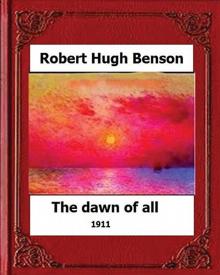 The Dawn of All
The Dawn of All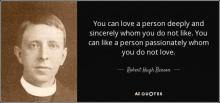 By What Authority?
By What Authority?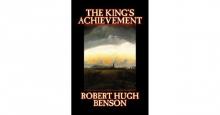 The King's Achievement
The King's Achievement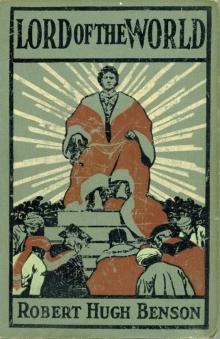 Lord of the World
Lord of the World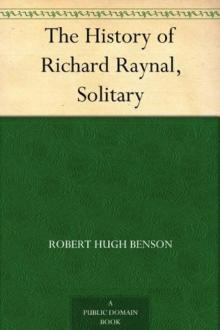 The History of Richard Raynal, Solitary
The History of Richard Raynal, Solitary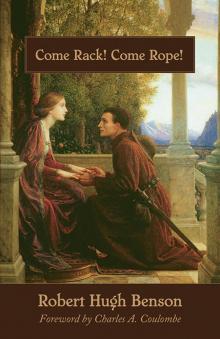 Come Rack, Come Rope
Come Rack, Come Rope